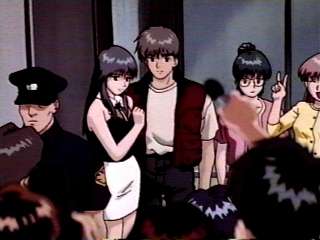![]()


Shin-Kimagure Orange Road
So Shite, Ano Natsu No Hajimari
(Summer's Beginning)
Copyright: © 1996 Toei/VAP Video/Studio Pierrot (Japan)
Length: 100 minutes
Rating: NR, Parental Guidance Suggested
Format: Original Japanese Dialog (LD)
Story: Izumi Matsumoto Visual Concept: Izumi Matsumoto Original Character Design: Izumi Matsumoto
![]()
In 1994, Kasuga Kyosuke is a student photographer in Bosnia during the war. An explosion from mortar fire throws him into the air, and...
It's 1991. At a bayside hotel, Kasuga is in bed, waiting nervously. The sound of a running shower stops, and a door opens. Madoka, wrapped in a towel, emerges, and then gets into bed with Kyosuke. Kyosuke feels the warmth of her body, her lips approaching... only to be awakened by the ringing of an insistant telephone. Still drowsy from his dream, a mysterious voice, claiming to be him, warns Kyosuke to be wary of cars. Later, while running to catch a train, Kyosuke finds out just what the warning meant... but the impact only puts his body into the hospital. His soul finds itself manifested in 1994!
The import LD comes in a well-packaged box, with several colour images in book form. The box is thicker than normal, since it's also a CD case for four CD's. The folks at VAP are kind enough to include the complete vocal collection CD, which means there are slots for three more... well, that's marketing for you!
![]()
          
|
I had been patiently waiting for this movie to arrive on my doorstep. That in itself is not good, since it tends to set unrealistic expections -- and in this case, that's exactly what happened. ShinKOR is in my view, merely a vehicle to keep the series going. It does break some new ground for those who had been following the series from the beginning -- primarily, the progression of Madoka's and Kyosuke's relationship. Most of the older characters are back as well, though in very minor roles. Hatta, Komatsu, Kurumi and Manami make what really amounts to cameo appearances. Of the original cast, only Kyosuke, Madoka, Hikaru, Grandpa, Master and Hayakawa Mitsuru (from the OAV series) have significant roles in this movie. Technically, the movie has a lot to be desired. Animation is unremarkable at best; the frame rate is surprisingly low for a modern production. Backgrounds are very rich in detail, but there's so much panning that it's more annoying than enriching. Some limited use of computer-generated images are incorporated, but are not particularily notable, except perhaps with the opening titles (I thought that the rotating shadow around the KOR logo was very classy.) The most obvious visual aspect of the show are the character designs. Gone are the cutesy Takada Akemi cast, to be replaced with much more severly drawn, at times very plain-looking players by character designer Goto Takayuki. The biggest tranformation is with Hikaru, who physically has gone from a young, pre-teen looking girl to a young woman with flowing long blonde hair. Madoka has lost her exotic sexy appearance and looks almost dowdy, whereas Kyosuke looks very much a young man in his 20's. I'm rather ambivalent about the change in characters -- I've always been very fond of the Takada Akemi designs, but the new Goto designs are more 'realistic'. Music, another area where KOR has traditionally been very strong, was disappointingly very ordinary. Much of the vocal soundtrack has a very non-descript techno sound to it (no doubt to appeal to the older teen/young adult crowd), and the only really nice piece is the Kyosuke #1 piano solo played by the 22 year-old Madoka, which is also used as the opening theme. Gone also are the mournful wailings of Madoka's sax, as are the plaintive ballades of Kanako Wada. (In fact, when we pan across Madoka's house/studio, there's no sign of her trademark instrument.) Which brings us to the meat of things: the story. A lot of the KOR series, as well as the first movie concentrates on the 'coming of age' aspect in youths. While ShinKOR does advance the Kyosuke/Madoka relationship, as well as fill in what happened after Ano Hi Ni Kaeritai, the character development aspect feels like it's glossed over. Instead, the entire point of the movie seem to be to bring the main trio back together, in order to have more KOR products (sorry -- couldn't resist the homophonic pun), and get the main characters past their first love-making encounter. It's not an exploitative type show; but the whole 'first love' aspect is handled awkwardly, as if Matsumoto Izumi himself was uncomfortable with the subject. A lot of unnecessary flashbacks punctuate the show as well, making the movie feel about 20 minutes too long. A disappointing product, especially after the well-written effort in the first movie. |
![]()
| Original: | Subbed: | Dubbed: | |
|---|---|---|---|
| Story: | N/A | N/A | |
| Direction: | N/A | N/A | |
| Acting: | N/A | N/A | |
| Animation: | N/A | N/A | |
| Music: | N/A | N/A | |
| Translation: | N/A | N/A | N/A |
| Overall Rating: | N/A | N/A |
![]()
[ << prev ] [ top ] [ next >> ]
[ home ]
[ what's new ]
[ café contest ]
[ café reviews ]
[ parent's guide ]
[ encyclopædia ]
[ café trivia ]
[ café latté ]
[ café espresso ]
[ about the café ]
[ feedback ]
[ links ]
[ site map ]
© 1997-2000. All rights reserved. The Animé Café logo and the Crystal Kyoko award are original creations of the Animé Café. Please do not use any of the materials on this site without the expressed written permission of the Animé Café.
Page last modified 1998.11.19
